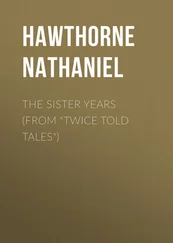Nathaniel Hawthorne - The Ancestral Footstep (fragment)
Здесь есть возможность читать онлайн «Nathaniel Hawthorne - The Ancestral Footstep (fragment)» — ознакомительный отрывок электронной книги совершенно бесплатно, а после прочтения отрывка купить полную версию. В некоторых случаях можно слушать аудио, скачать через торрент в формате fb2 и присутствует краткое содержание. Жанр: literature_19, foreign_antique, foreign_prose, на английском языке. Описание произведения, (предисловие) а так же отзывы посетителей доступны на портале библиотеки ЛибКат.
- Название:The Ancestral Footstep (fragment)
- Автор:
- Жанр:
- Год:неизвестен
- ISBN:нет данных
- Рейтинг книги:5 / 5. Голосов: 1
-
Избранное:Добавить в избранное
- Отзывы:
-
Ваша оценка:
- 100
- 1
- 2
- 3
- 4
- 5
The Ancestral Footstep (fragment): краткое содержание, описание и аннотация
Предлагаем к чтению аннотацию, описание, краткое содержание или предисловие (зависит от того, что написал сам автор книги «The Ancestral Footstep (fragment)»). Если вы не нашли необходимую информацию о книге — напишите в комментариях, мы постараемся отыскать её.
The Ancestral Footstep (fragment) — читать онлайн ознакомительный отрывок
Ниже представлен текст книги, разбитый по страницам. Система сохранения места последней прочитанной страницы, позволяет с удобством читать онлайн бесплатно книгу «The Ancestral Footstep (fragment)», без необходимости каждый раз заново искать на чём Вы остановились. Поставьте закладку, и сможете в любой момент перейти на страницу, на которой закончили чтение.
Интервал:
Закладка:
In these sweet and delightful moods of mind, varying from one dream to another, he loved indeed the solitude of his way; but likewise he loved the facility which his pursuit afforded him, of coming in contact with many varieties of men, and he took advantage of this facility to an extent which it was not usually his impulse to do. But now he came forth from all reserves, and offered himself to whomever the chances of the way offered to him, with a ready sensibility that made its way through every barrier that even English exclusiveness, in whatever rank of life, could set up. The plastic character of Middleton was perhaps a variety of American nature only presenting itself under an individual form; he could throw off the man of our day, and put on a ruder nature, but then it was with a certain fineness, that made this only [a] distinction between it and the central truth. He found less variety of form in the English character than he had been accustomed to see at home; but perhaps this was in consequence of the external nature of his acquaintance with it; for the view of one well accustomed to a people, and of a stranger to them, differs in this – that the latter sees the homogeneity, the one universal character, the groundwork of the whole, while the former sees a thousand little differences, which distinguish the individual men apart, to such a degree that they seem hardly to have any resemblance among themselves.
But just at the period of his journey when we take him up, Middleton had been for two or three days the companion of an old man who interested him more than most of his wayside companions; the more especially as he seemed to be wandering without an object, or with such a dreamy object as that which led Middleton's own steps onward. He was a plain old man enough, but with a pale, strong-featured face and white hair, a certain picturesqueness and venerableness, which Middleton fancied might have befitted a richer garb than he now wore. In much of their conversation, too, he was sensible that, though the stranger betrayed no acquaintance with literature, nor seemed to have conversed with cultivated minds, yet the results of such acquaintance and converse were here. Middleton was inclined to think him, however, an old man, one of those itinerants, such as Wordsworth represented in the "Excursion," who smooth themselves by the attrition of the world and gain a knowledge equivalent to or better than that of books from the actual intellect of man awake and active around them.
Often, during the short period since their companionship originated, Middleton had felt impelled to disclose to the old man the object of his journey, and the wild tale by which, after two hundred years, he had been blown as it were across the ocean, and drawn onward to commence this search. The old man's ordinary conversation was of a nature to draw forth such a confidence as this; frequently turning on the traditions of the wayside; the reminiscences that lingered on the battle-fields of the Roses, or of the Parliament, like flowers nurtured by the blood of the slain, and prolonging their race through the centuries for the wayfarer to pluck them; or the family histories of the castles, manor-houses, and seats which, of various epochs, had their park-gates along the roadside and would be seen with dark gray towers or ancient gables, or more modern forms of architecture, rising up among clouds of ancient oaks. Middleton watched earnestly to see if, in any of these tales, there were circumstances resembling those striking and singular ones which he had borne so long in his memory, and on which he was now acting in so strange a manner; but [though] there was a good deal of variety of incident in them, there never was any combination of incidents having the peculiarity of this.
"I suppose," said he to the old man, "the settlers in my country may have carried away with them traditions long since forgotten in this country, but which might have an interest and connection, and might even piece out the broken relics of family history, which have remained perhaps a mystery for hundreds of years. I can conceive, even, that this might be of importance in settling the heirships of estates; but which now, only the two insulated parts of the story being known, remain a riddle, although the solution of it is actually in the world, if only these two parts could be united across the sea, like the wires of an electric telegraph."
"It is an impressive idea," said the old man. "Do you know any such tradition as you have hinted at?"
April 13th . – Middleton could not but wonder at the singular chance that had established him in such a place, and in such society, so strangely adapted to the purposes with which he had been wandering through England. He had come hither, hoping as it were to find the past still alive and in action; and here it was so in this one only spot, and these few persons into the midst of whom he had suddenly been cast. With these reflections he looked forth from his window into the old-fashioned garden, and at the stone sundial, which had numbered all the hours – all the daylight and serene ones, at least – since his mysterious ancestor left the country. And [is] this, then, he thought to himself, the establishment of which some rumor had been preserved? Was it here that the secret had its hiding-place in the old coffer, in the cupboard, in the secret chamber, or whatever was indicated by the apparently idle words of the document which he had preserved? He still smiled at the idea, but it was with a pleasant, mysterious sense that his life had at last got out of the dusty real, and that strangeness had mixed itself up with his daily experience.
With such feelings he prepared himself to go down to dinner with his host. He found him alone at table, which was placed in a dark old room modernized with every English comfort and the pleasant spectacle of a table set with the whitest of napery and the brightest of glass and china. The friendly old gentleman, as he had found him from the first, became doubly and trebly so in that position which brings out whatever warmth of heart an Englishman has, and gives it to him if he has none. The impressionable and sympathetic character of Middleton answered to the kindness of his host; and by the time the meal was concluded, the two were conversing with almost as much zest and friendship as if they were similar in age, even fellow-countrymen, and had known one another all their life-time. Middleton's secret, it may be supposed, came often to the tip of his tongue; but still he kept it within, from a natural repugnance to bring out the one romance of his life. The talk, however, necessarily ran much upon topics among which this one would have come in without any extra attempt to introduce it.
"This decay of old families," said the Master, "is much greater than would appear on the surface of things. We have such a reluctance to part with them, that we are content to see them continued by any fiction, through any indirections, rather than to dispense with old names. In your country, I suppose, there is no such reluctance; you are willing that one generation should blot out all that preceded it, and be itself the newest and only age of the world."
"Not quite so," answered Middleton; "at any rate, if there be such a feeling in the people at large, I doubt whether, even in England, those who fancy themselves possessed of claims to birth, cherish them more as a treasure than we do. It is, of course, a thousand times more difficult for us to keep alive a name amid a thousand difficulties sedulously thrown around it by our institutions, than for you to do, where your institutions are anxiously calculated to promote the contrary purpose. It has occasionally struck me, however, that the ancient lineage might often be found in America, for a family which has been compelled to prolong itself here through the female line, and through alien stocks."
Читать дальшеИнтервал:
Закладка:
Похожие книги на «The Ancestral Footstep (fragment)»
Представляем Вашему вниманию похожие книги на «The Ancestral Footstep (fragment)» списком для выбора. Мы отобрали схожую по названию и смыслу литературу в надежде предоставить читателям больше вариантов отыскать новые, интересные, ещё непрочитанные произведения.
Обсуждение, отзывы о книге «The Ancestral Footstep (fragment)» и просто собственные мнения читателей. Оставьте ваши комментарии, напишите, что Вы думаете о произведении, его смысле или главных героях. Укажите что конкретно понравилось, а что нет, и почему Вы так считаете.












